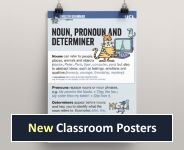Word classes: Interjections
Interjections are a group of words which are commonly used in spoken language to express emotions, reactions and so on. It is generally difficult to categorise them into one of the eight major word classes.
Examples include the following:
- oh, wow, aha, ouch, tut-tut, ugh, oops, humph, hooray, yuck, whew, yikes, eek
Interjections can occur on their own, or in sequence (e.g. oh wow), and can also be attached to a sentence. These examples are all from informal conversations:
Welcome back!

Englicious is totally free for everyone to use!
But you will have to log in to see our library of teaching resources.
If you don’t have an account, that’s perfectly OK. You can register (for free).
It only takes a minute or two.
»
- Printer-friendly version
- Log in to view or leave comments

